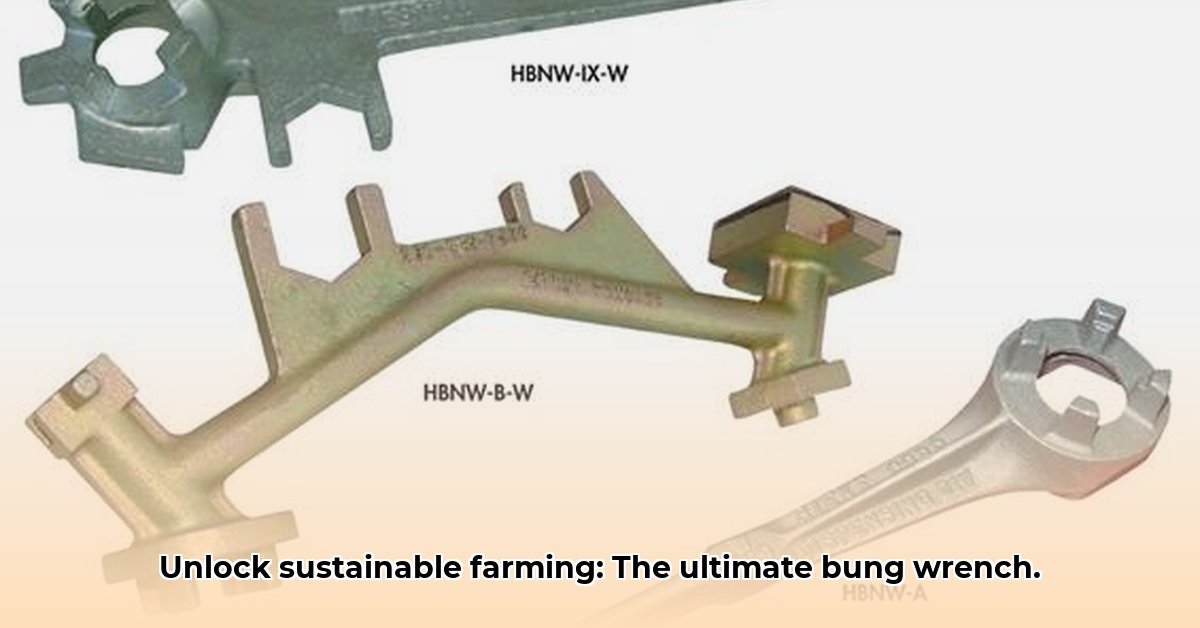
Bung Wrench Tractor Supply: Optimizing Farm Efficiency and Sustainability
Maintaining peak farm equipment performance isn't solely about profit; it's about responsible land stewardship. Even seemingly minor choices, such as selecting the right oil filter wrench, significantly impact long-term sustainability. This guide explores the crucial role of proper wrench selection in achieving efficient and environmentally conscious farming practices.
Did you know that neglecting regular maintenance can lead to significant financial losses and environmental damage? A well-maintained tractor, for example, consumes less fuel, reducing your carbon footprint and operating costs. This is where the humble oil filter wrench becomes a vital tool for sustainable farming.
The Importance of Preventative Maintenance: A Cornerstone of Sustainable Farming
Think of your tractor as a vital asset. Ignoring warning signs, similar to neglecting routine maintenance, leads to costly repairs, downtime, and frustration. Regular oil changes and filter replacements are crucial for preserving engine health and extending equipment lifespan. Investing in a reliable oil filter wrench, readily available at Tractor Supply, is a simple yet effective step towards proactive maintenance.
Selecting the Right Oil Filter Wrench: Your Guide to Tractor Supply's Options
Tractor Supply offers a diverse range of oil filter wrenches. The ideal choice depends on your equipment's specific needs and filter accessibility. Always consult your equipment's manual to determine the correct size and type.
- Cap Wrench: This standard wrench is economical and suitable for easily accessible filters.
- Strap Wrench: Ideal for hard-to-reach filters, its flexible strap provides a secure grip on various filter shapes and sizes.
- Cup Wrench: Designed for specific filter sizes, offering a precise and powerful grip.
Prioritizing quality is critical. A poorly made wrench could slip, causing filter damage or injury. Investing in a durable wrench will ensure safe and efficient oil changes over time.
Sustainable Farming: The Cumulative Impact of Small Choices
Sustainable agriculture considers the entire process, from resource utilization to waste management. While Tractor Supply might not always provide detailed sourcing information for its wrenches, we can still promote sustainability through conscious choices.
- Invest in Durability: Opt for a high-quality, long-lasting wrench to minimize replacements and reduce waste.
- Responsible Disposal: Adhere to local regulations for used oil and filter disposal. Many Tractor Supply stores offer used oil recycling programs.
- Advocate for Change: Contact Tractor Supply and wrench manufacturers, encouraging them to adopt sustainable practices and provide transparent sourcing details. Consumer demand plays a critical role in shaping industry practices.
The Big Picture: Fuel Efficiency and Environmental Responsibility
Proper equipment maintenance translates directly into improved fuel efficiency. A well-maintained engine runs more efficiently, consuming less fuel and reducing greenhouse gas emissions. This approach benefits both your budget and the environment. Selecting the right tools, including the appropriate oil filter wrench from Tractor Supply, contributes significantly to these cost savings and environmental benefits.
Taking Action: A Collaborative Approach to Sustainable Farming
Sustainable farming requires a collaborative effort across various stakeholders:
| Stakeholder | Short-Term Actions | Long-Term Goals |
|---|---|---|
| Farmers | Implement regular maintenance schedules; invest in quality tools. | Adopt sustainable practices; prioritize eco-friendly parts sourcing. |
| Tractor Supply & Manufacturers | Provide detailed information on wrench materials and recycling. | Develop and promote wrenches made from recycled or sustainable materials. |
| Government Agencies | Offer incentives for farmers to adopt sustainable practices. | Enforce stricter policies for responsible waste disposal. |
Implementing these strategies, starting with selecting the correct oil filter wrench, is a pivotal step towards building a more sustainable and efficient agricultural system.
How to Choose Eco-Friendly Oil Filter Wrenches for Sustainable Farming
Sustainable farming extends beyond crop production; it encompasses responsible equipment maintenance. Choosing an environmentally conscious oil filter wrench significantly impacts your farm's overall environmental footprint. Let's examine the key factors in selecting such a wrench.
Key Takeaways:
- Selecting the appropriate oil filter wrench is crucial for extending equipment lifespan, thus reducing waste and promoting sustainability.
- Environmentally friendly wrenches emphasize the use of recycled materials, prioritising durable and long-lasting construction.
- Regular and proper maintenance directly extends engine life, resulting in lower fuel consumption and subsequently reduced emissions.
- Precision in wrench selection ensures a tight fit, preventing damage and oil leaks.
- A well-maintained engine is directly correlated with minimal emissions and optimized fuel efficiency.
Choosing the Right Wrench: A Step-by-Step Guide
- Identify Filter Size: Consult your equipment's manual to determine the precise filter size. Using an improper wrench can cause damage and lead to environmental harm.
- Select Wrench Type: Consider the accessibility of the oil filter. Cap-type wrenches suffice for easy-to-reach filters, while strap wrenches are more versatile for harder-to-reach areas.
- Prioritize Materials: While strength is paramount, opt for wrenches crafted from recycled materials whenever possible.
- Ergonomic Considerations: Prioritize comfort and ease of use; a comfortable grip minimizes fatigue during prolonged use.
Beyond Wrench Selection: Broader Sustainable Practices
The oil filter wrench is just one element of a broader sustainable farming strategy. Additional key practices include:
- Adherence to Recommended Oil Change Intervals: This practice is critical for maximizing engine life and minimizing wasted oil.
- Responsible Waste Oil Disposal: Locate and utilize local used oil recycling programs frequently offered at auto parts stores and repair shops.
- Fuel Efficiency: Prioritize efficient equipment operation to minimize fuel consumption and greenhouse gas emissions. Proper equipment maintenance including regular oil changes is essential in this regard.
By combining the selection of eco-friendly oil filter wrenches with these broader maintenance practices, you are actively contributing to a more sustainable and efficient farming operation. Remember: even minor changes can lead to significant long-term benefits for both your farm's productivity and the environment.